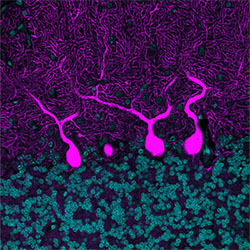Kathleen J Millen, PhD

- Academic Title: Professor
- Research Title: Principal Investigator
- Research Center: Norcliffe Foundation Center for Integrative Brain Research
"As an undergraduate student, I fell in love with developmental biology while watching a fertilized worm egg divide and turn into a complex embryo in real time, under a microscope. From that day forward, Ive marveled at the complex symphony of biological events that create each one of us. Studying brain birth defects provides me with the ability to study the basic mechanisms of developmental biology while also having an impact on the clinical care of affected individuals and their families."
-
Biography
Kathleen J. Millen, PhD, is an professor of pediatrics at the University of Washington School of Medicine. She is also a principal investigator at Seattle Childrens Hospital Research Institute, Norcliffe Foundation Center for Integrative Brain Research. Her research laboratory focuses on the genetic basis of early brain development, intellectual disability (intellectual developmental disorder), autism and hydrocephalus.
In particular, her lab uses the synergy of both human and mouse genetics to identify genes causing cerebellar malformations and then defines the underlying developmental processes necessary for normal development. Although her studies are of basic science interest, they also have considerable clinical relevance. Specifically, her group identified the first genes for human Dandy-Walker malformation, the most common structural defect of the cerebellum affecting 1/5000 births and often causing significant intellectual and motor delays. Concurrently she is also studying multiple mouse mutants with abnormal cerebellar development to gain insights into the fundamental developmental programs that drive brain cell fate specification and patterning. These studies in turn provide new candidate genes for human developmental brain disorders.
Research Description
Our research program seeks to explore the molecular genetic pathways and cellular processes which determine how the developing vertebrate central nervous system (CNS) acquires pattern during early neurogenesis. We primarily focus on congenital malformations of the cerebellum and has implications for the genetic basis of intellectual disability and autism. Our approach is to combine the power and strengths of both mouse and human genetics with embryological analysis in mice and other model vertebrates, to identify the molecular and cellular events that regulate cerebellar development.
We have identified the first genes for Dandy-Walker malformation, the most common structural defect of the cerebellum affecting 1/5000 births and causing significant intellectual and motor delays. Using mice to model these defects we have defined the developmental basis of the pathology and gained new insights regarding novel mechanisms of CNS development. Concurrenlty we are studying multiple mouse mutants with abnormal cerebellar development to gain insights into the fundamental developmental programs that drive cerebellar cell fate specification and patterning.Research Focus Area
Genetics and Developmental Biology, Neuroscience / Neurodevelopment, Stem Cell Biology
-
Related Resources
-
View the Seattle Children's Research Institute profile of Kathleen Millen, PhD including their publications and grants.
-
The Millen Lab has long been interested in the genetic and developmental basis of structural birth defects of the brain both in humans and animal models. The team has a specific interest in malformations of the cerebellum, a brain structure that lies between the brainstem and the cerebrum and plays important roles in sensory perception, motor output, balance and posture in addition to cognition and emotion.
-
Mapping the Emergence of Neurons in the Developing Brain
Seattle Children’s Drs. Kathleen Millen and Parthiv Haldipur co-led a first-ever study of the earliest emergence of neurons in the developing human cerebellum.
-
-
Patient Testimonials
-
Awards and Honors
Loading...Award Name Award Description Awarded By Award Date {{ award.name }} {{ award.description }} {{ award.organization }} {{ award.displayDate }} No Awards and Honors found for Kathleen J Millen, PhD
-
Publications
Loading...No Publications found for Kathleen J Millen, PhD
-
Presentations
Loading...Presentation Title Event Location Date {{ presentation.title }} {{ presentation.presentedAt }} {{ presentation.location }} {{ presentation.displayDate }} No Presentations found for Kathleen J Millen, PhD
-
Research Funding
Loading...Grant Title Grantor Amount Award Date {{ funding.title }} {{ funding.grantedBy }} {{ funding.amount }} {{ funding.displayDate }} No Research Funding found for Kathleen J Millen, PhD
-
Clinical Trials and Research Studies
Loading...{{ item.st }}
No clinical trials found for Kathleen J Millen, PhD.

